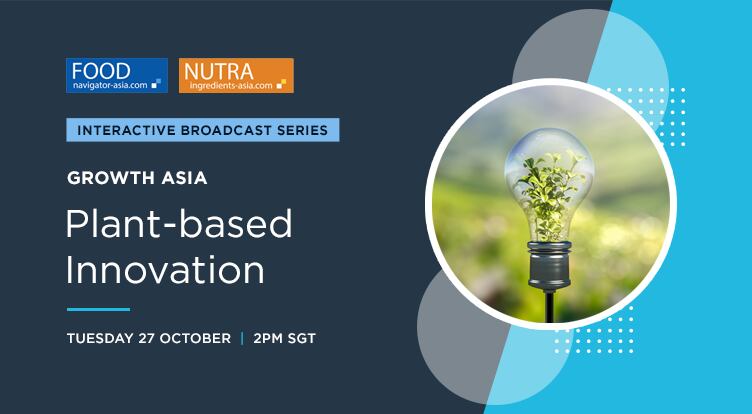This will be the four industry giants’ main topic of dicsussion at our Growth Asia 2020 interactive broadcast session on Plant-Based Innovation next week and across the board, representatives from all four firms unanimously agree that the plant-based trend in Asia is going to be a lasting lifestyle change for local consumers, and not just a short-term fad.
“The growth of the plant-based industry is driven by multiple factors, and the two main ones are food system sustainability and health and wellness,” PepsiCo External Innovation R&D Senior Manager Siow Ying Tan told FoodNavigator-Asia.
“Populations everywhere are interested in improving their quality of life, and view plant-based diets as part of their health and nutrition strategy, whereas from a sustainability point of view, plant-based foods are drawing interest as these use use less water, energy, land to generate same amount of food.
“Why we believe this is here to stay is the important underlying factor that people are concerned about health and nutrition, and this as a whole tends to be fundamental motivation – that, and also good taste is paramount, so if product taste can continue to improve based on the ingredients that go into these, this will drive the success of the plant-based sector.”
Tan will be a keynote speaker for the session and will be sharing more about PepsiCo’s interest in the plant-based space, and what the company looks for when it comes to collaborations within the sector.
Givaudan Head of Innovation APAC Alex Ward added that the health and wellness aspect was exceptionally clear given recent consumer findings that for plant-based dairy, Asian consumers are particularly interested in maximising health benefits when consuming these as opposed to vegan or vegetarian concerns.
“We’ve found that consumers in Asia are very big on maximising the health benefits of products when they select plant-based dairy, so enhancing functionality is an important area for us here, for example cholesterol reduction using oat fibre, reducing sugar content, enhancing the digestion element and so on,” he said.
“Health claims in this space are also evolving, products claiming more benefits around cholesterol, fat, fibre, and protein content.”
As for sustainability, he highlighted that 75% of the world’s food comes from 12 plants and five animals, which is increasingly being recognised as a problem in Asia.
Ward will be sharing Givaudan’s insights into plant-based seafood and its APAC strategy next week.
DuPont has included both Health and Sustainability as major pillars of its latest Danisco Planit range focusing on plant-based ingredients, in addition to Deliciousness and Responsiveness, believing that this will be key in helping to secure repeat consumers.
“One of the challenges for the plant-based industry is to get consumers to move from ‘try it once’ to ‘regular part of my diet’. Consumers are not looking to avoid meat or dairy; they are looking for a great eating experience while caring for a better planet and a better health – we need to widen the food space here to provide more versatile food menu and options,” DuPont Asia Pacific Regional Marketing Leader Michelle Lee said.
“For the past couple of years, the plant-based industry has been a race to get on the shelves of foodservice and retailers. Now it’s about growing further by offering a greater variety of categories, [which] requires a gear change in the industry [and] exploring innovation beyond imitation.”
Lee will be joining us next week to discuss plant-based innovation specific to the APAC region.
Food safety also key
In addition to health and wellness and sustainability, the COVID-19 pandemic has also driven core food supply issues such as food safety into the limelight, which has also driven the popularity of plant-based products in recent months.
According to plant-based egg firm Eat Just’s CEO Josh Tetrick, the shift towards plant-based everywhere may be happening a lot quicker than originally expected because of the pandemic, including in the APAC region.
“COVID-19 has gotten a lot of people thinking just what caused it, and [a key factor] is our collision with animals, enabling zoonotic diseases to jump from non-human animals to humans, and a big cause here is animal farming and animal protein consumption,” he said.
“Consumers, industries and governments are becoming increasingly aware about this too – take China which is actively encouraging more FDI in plant-based ventures. It’s not just because they care about consumer health, but also about food safety and mitigating food safety issues which has long-term outcomes such as preserving the economy.”
Tetrick will be a keynote speaker discussing the rise of Eat Just’s plant-based egg with Asia as one of the company’s main targets, as well as the firm’s new cell-based initiatives.
All four experts will also be participating in a panel discussion on the plant-based industry, where all attendees will be able to surface questions directly to them.
Register here to attend the Growth Asia 2020 Plant-Based Innovation session happening on October 27, 2pm SGT.





